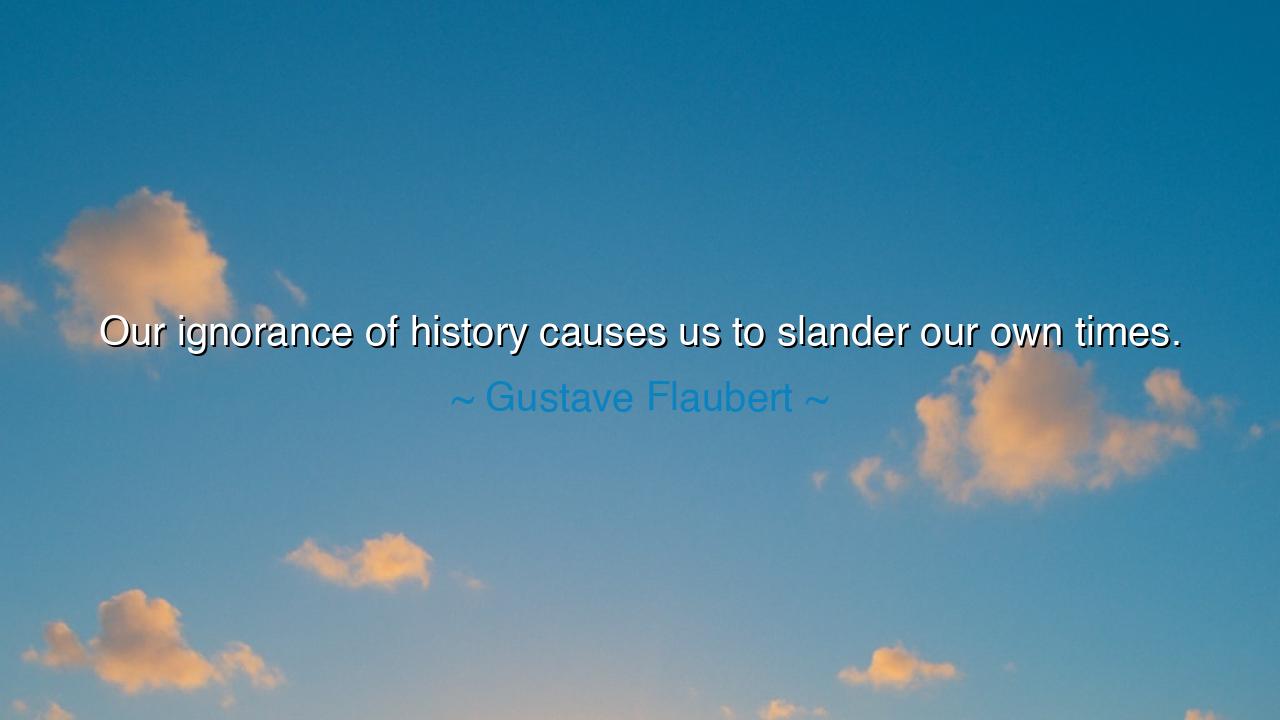
Our ignorance of history causes us to slander our own times.






“Our ignorance of history causes us to slander our own times.” — Thus spoke Gustave Flaubert, a man who understood that memory is the mirror of civilization, and that to forget the past is to lose the power to see the present with wisdom. His words cut like a chisel into the stone of human folly, for they remind us that every age, even our own, stands accused not by its sins, but by our blindness to the struggles that came before it. The heart of his saying is not cynicism, but a plea: remember, lest your judgment be shallow and your gratitude small.
In every generation, there are those who sigh, “The world has never been worse.” They look around and see corruption, vanity, and chaos, and they mourn the supposed golden days that have faded into dust. Yet this lament springs not from truth, but from ignorance of history. For those who study the past know that every age has been marked by turmoil and triumph, by cruelty and compassion. The ancients quarreled, the empires fell, the plagues came, and yet humanity endured — always believing its own time to be the end of virtue. Flaubert saw this pattern, and with sharp wisdom, warned that such blindness turns us into slanderers of our own times, unable to recognize the progress born of pain.
Consider the story of the Middle Ages, once derided as the “Dark Ages.” For centuries, people spoke of that era as one of ignorance and stagnation. Yet modern scholars, armed with knowledge and patience, uncovered the truth: it was also an age of faith, innovation, and endurance. The cathedrals of Europe rose like prayers in stone; universities were founded; philosophers pondered the harmony between faith and reason. To call it “dark” was to betray the light that burned within it — a light we might have seen, had we not been blinded by arrogance. Thus, Flaubert’s warning proves true: when we fail to know history, we insult not only our ancestors but also ourselves.
There is another tale — that of the Industrial Revolution. To those who lived through its smoke and noise, it seemed an age of greed and suffering. Children worked in factories, cities groaned under pollution, and many feared that humanity was becoming enslaved to the machine. Yet from that same furnace of struggle came the modern world — medicine, education, democracy, and the rights of laborers. Those who condemned their own age failed to see the seed within the soot. They mistook the birth pangs of progress for decay. Such is the blindness that ignorance brings.
Flaubert teaches us that to know history is to see the continuity of the human spirit — to understand that we are not fallen angels, nor saints, but travelers on an eternal road. Each generation inherits both the sins and the wisdom of its forebears. When we forget that road, we stumble in arrogance, believing our pain to be unique and our age to be cursed. But when we study the past, we learn humility: we see that our ancestors faced the same storms — and prevailed. Then we can stand upright, not despairing of our times, but working to redeem them.
Therefore, let us learn history not as a catalogue of dates, but as the heartbeat of humanity. Read the chronicles of Rome, the letters of revolutionaries, the diaries of mothers and soldiers. In their words, you will find yourself reflected — your fears, your hopes, your flaws. Knowledge of the past does not imprison you; it liberates you. It teaches you that no time is wholly wicked, no age wholly lost. Even in the darkest century, there were hearts that burned with light.
Take this as your lesson: before you curse the present, study the past. Before you despise your generation, seek to understand it in the long river of human striving. Speak not as a slanderer of your own age, but as a witness who honors the courage it takes to live in any age. In your conversations, your writings, your thoughts — be one who remembers.
For the one who knows history walks through the present with reverence. They do not cry, “The world is doomed!” but whisper, “The world has always struggled — and yet, it endures.” Such knowledge is not merely wisdom; it is hope. And in hope lies the salvation of every time, including our own.






AAdministratorAdministrator
Welcome, honored guests. Please leave a comment, we will respond soon